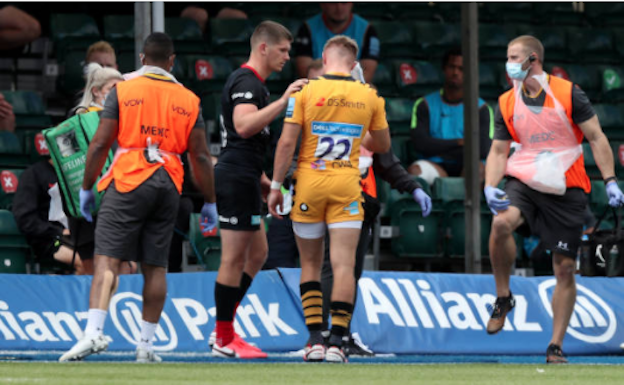Owen Farrell explained that he misjudged Charlie Atkinson’s change of direction when committing a dangerous tackle, the ten-page written judgement regarding his five-match ban has revealed.
Saracens flyhalf Farrell was shown a red card for the horrible-looking hit on Wasps’ Atkinson, who is currently recovering from the head knock, in a Premiership clash last weekend.
Although the disciplinary panel concluded the tackle was a top-end offence with a suspension entry point of 10 matches, it was ultimately reduced to five due to mitigating circumstances.
COLUMN: Farrell has to correct tackle technique
The English RFU has now published the short-form judgement which detailed the key elements of Farrell’s defence during his virtual hearing on Tuesday, 8 September.
Speaking in his own defence, Farrell told the independent panel that he was 28 years old, has played 201 games for Saracens, has 83 Test caps for England, four caps for the British & Irish Lions and was the current England captain.
Farrell went on the explain the mechanics of the tackle. He said that, after chasing a kick, his intention was to tackle Atkinson from the side and was aiming to hit him just below the shoulder in order to dislodge the ball from his grasp.
However, he admitted that he did not take into account Atkinson’s change of direction and was not in full control of his contact with the 18-year-old, but added that he was unaware that Akinson dipped slightly.
‘I was expecting to hit him between his shoulder and arm,’ Farrell told the independent panel.
The official judgement noted that Farrell apologised immediately and knew that he had gone over the shoulder upon contact with Atkinson. However, the panel considered the tackle reckless rather than intentional.
‘He apologised on the field. After he was dismissed, he waited at the side of the pitch for Atkinson, apologised to him and again in the clubhouse. He was gutted that he had caused the injury. He had not stopped thinking about it and was very disappointed in himself. He never ever thought he would get a red card as he had much pride and energy in setting high standards for himself. He said what he had done set a bad example.
‘This was a badly executed tackle, committed at high speed which resulted in the removal of Atkinson from the field of play.’
ALSO READ: Bakkies Botha questions Farrell ban
Farrell’s legal representative, Richard Smith QC, referred to the example set by Paul Gabrillagues’ successful appeal of an initial six-week ban in 2019, getting it reduced to three weeks.
‘The panel considered Smith’s submissions relating to mitigation very carefully and determined that having taken into account paragraphs 71-75 of the Gabrillagues appeal decision and our other findings, a 50 per cent reduction was justified.
‘Again it is not just a matter of arithmetics and a tick-box exercise. The player’s disciplinary record is not perfect. However, the only matter on his record is a two-week ban from four-and-a-half years ago when he was 24.
‘The regulations do not refer to a time when a previous sanction may be disregarded for mitigation purposes. There is an element of discretion. The panel concluded that such is the weight of other mitigating factors, including acknowledgement of culpability, obvious and genuine remorse and considerable [and exceptional] evidence as to the player’s good character that the two-week ban from four-and-a-half years ago should not prevent the player from receiving the maximum reduction by way of mitigation available.’
The full judgement is available here.
Photo: Getty Images





